Complex Systems Problems
Key concepts:
• cross-disciplinary resource & environmental challenges
• supply chain problems & ecosystem services
• co-dependent problems & roadmapping
• core attributes: self-organization, connectivity, feedback, collaboration (collaborative intelligence if their behavior is “smart”) and emergence
Gordon Feller’s work at Cisco, and through the organization he founded, City-Minded, focuses on smart cities. Their workshop entitled Embracing Complexity to Optimize Processes and Experiences — How Cities and Organizations Can Be Successful Using Data to Drive Results with Microsoft Senior Director Bill Mitchel, emphasizes that smart cities are a complex systems challenge.
The diagram below, from earthDECKS team member Zann Gill’s talk at Draper University, counterposes supply chain and ecosystem services, suggesting how technologies spring up to address problems identified in complex system analysis. Transparent supply chains are a prerequisite to address the problem of plastic debris. Founded in France in 2007, EcoVadis provides supplier sustainability ratings and enables tracking supply chains.
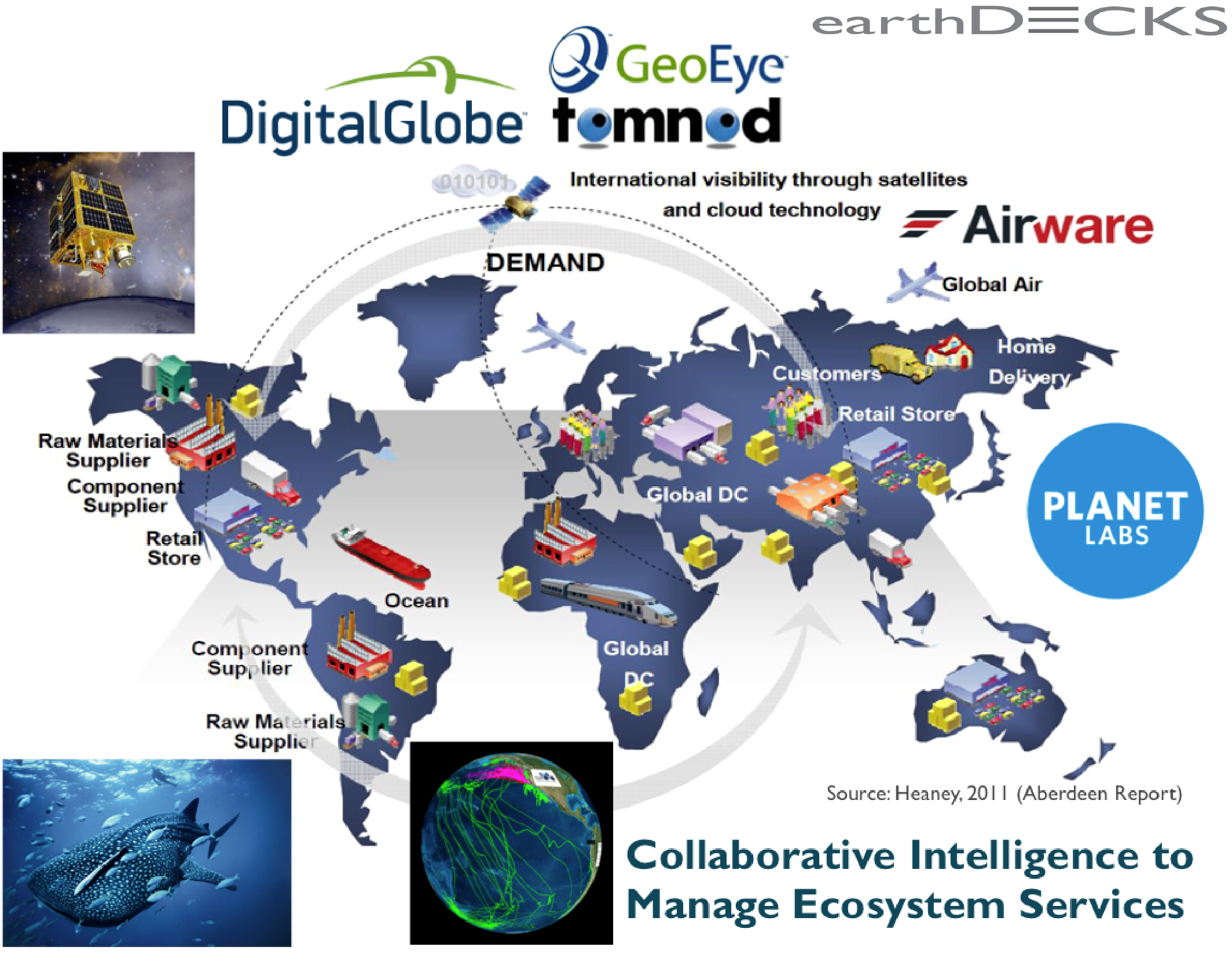
Complex systems have five core attributes: self-organization, connectivity, feedback, collaboration (collaborative intelligence if their behavior is “smart”) and emergence. Theories of complex systems describe how a large collection of distributed agents interact. To understand whole system behaviors requires understanding system topology, which agents interact, and how they interact. The connection between smart systems, including a smartly connected Internet of Things, distributed intelligence, and ultimately collaborative intelligence, is suggested by this summary from the James S. McDonnell Foundation.
Professor Jenna Jambeck focuses her research on the impact of plastic waste as a complex systems problem. Jambeck, J.R., Andrady, A., Geyer, R., Narayan, R., Perryman, M., Siegler, T., Wilcox, C., Lavender Law, K. , (2015). Plastic waste inputs from land into the ocean, Science, 347, p. 768-771.
In “Complex Systems: A Survey” M. E. J. Newman presents an overview of Complex Systems in a range of disciplines. The field of Complex Systems not only cuts across all traditional disciplines of science, but also includes engineering, management, and medicine.
Columbia University School of Engineering has embraced complex systems science as a means to tackle problems with many co-dependent moving parts, as shown in this diagram for a public health study analyzing sources of obesity:
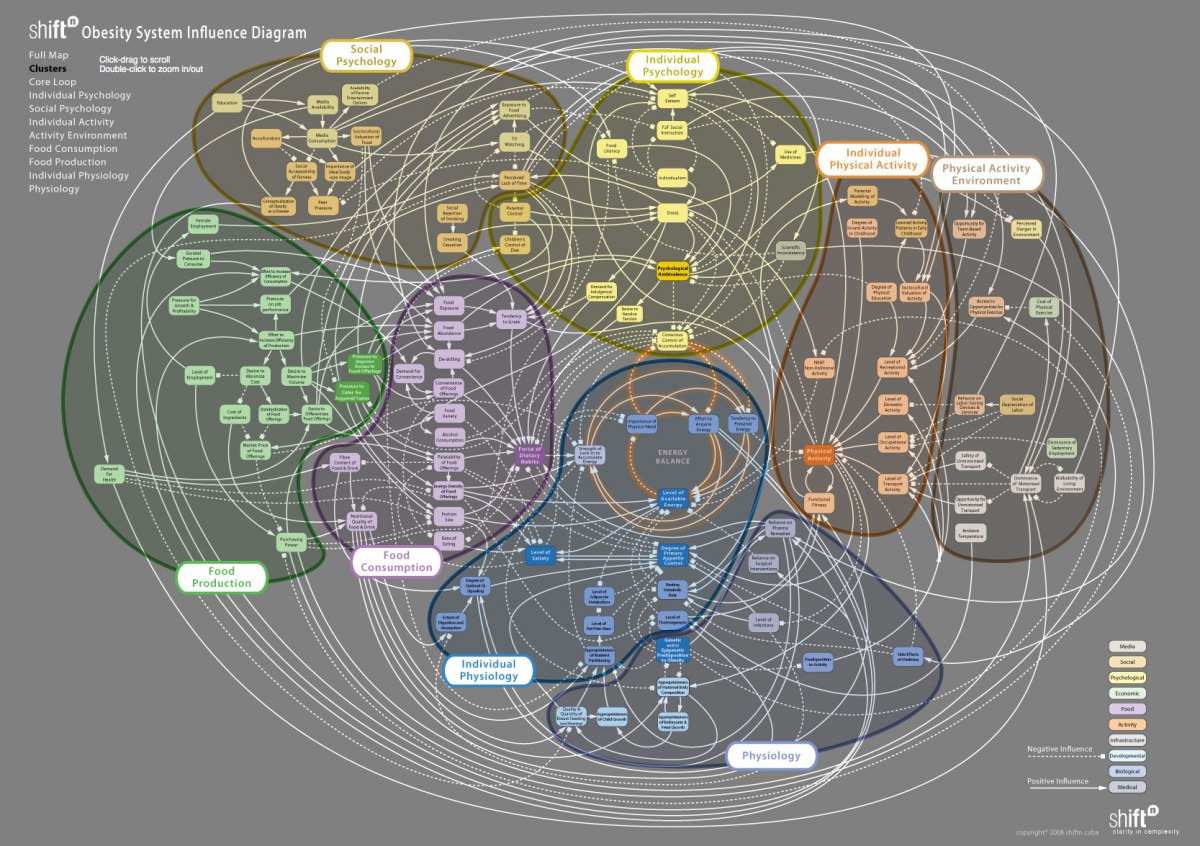
Complex Systems is a new field of science, which studies how parts of a system (its agents) give rise to emergent collective behaviors of the whole system, and how the system interacts with its environment. Examples of complex systems range from human organizations to the complex “collaborations” of genes as manifest in the whole organism, and the many factors that contribute to weather patterns. In complex systems it is often difficult to identify direct cause-effect links because the interdependency of the system components can allow a trigger in one part of the system to produce a visible effect in another part. Yaneer Bar-Yam, a pioneer in the development of the new discipline of complex systems science, uses the diagram below to describe key concepts.
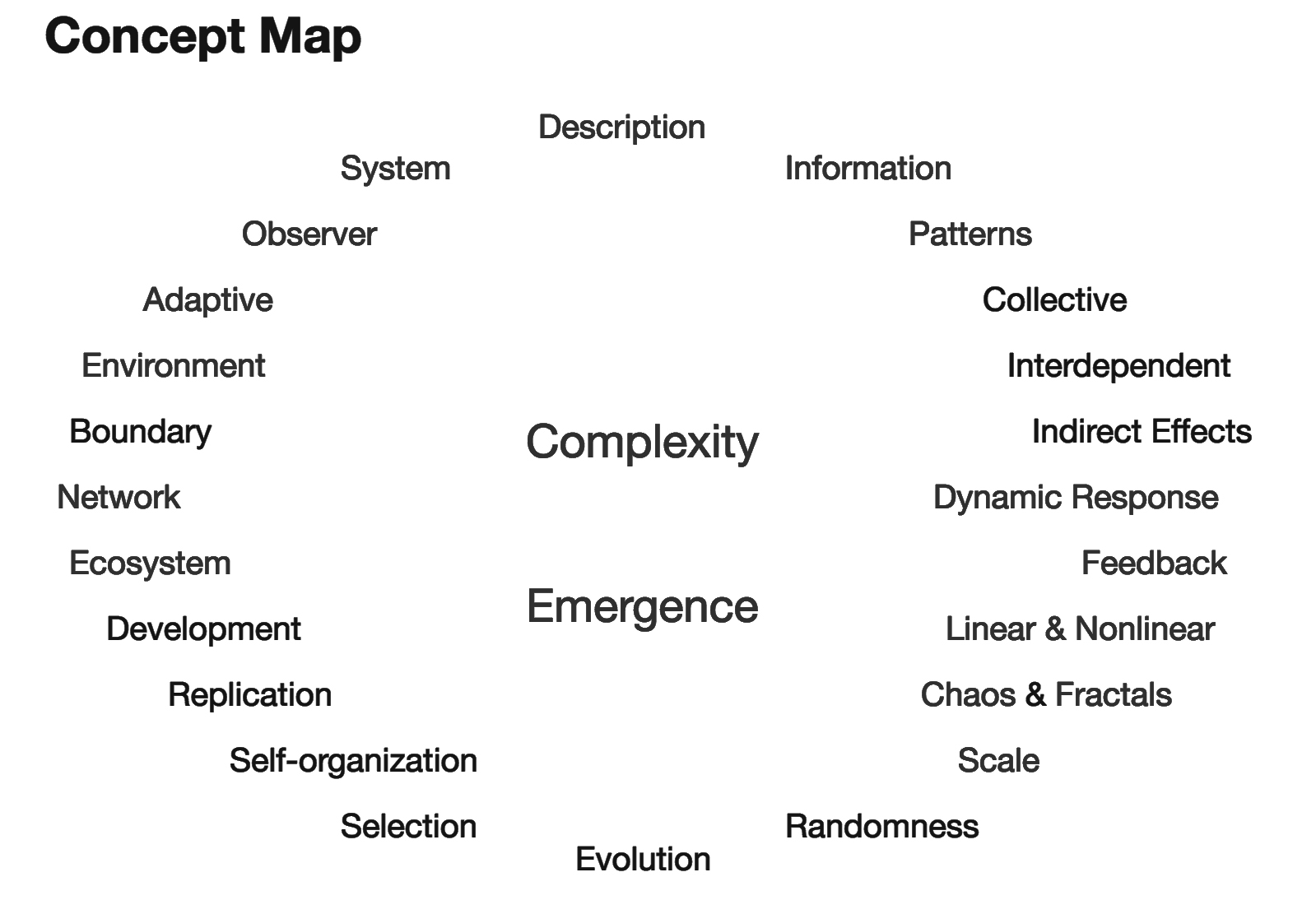
Image Credit: Dr. Yaneer Bar-Yam, Founder New England Complex Systems Institute (NECSI)
Industry offers models for tackling complex systems problems that earthDECKS aims to emulate. The power of an effective roadmapping process to address complex system problem-solving was demonstrated by the SEMATECH industry consortium process that developed the Sematech Roadmap, which helped drive the evolution of this nascent industry. There was a marked acceleration in the rate of technological change in the sector, which the process of roadmapping enabled. A new U.S. R&D strategy emerged.
earthDECKS proposes that an analogous process is needed to address complex environmental problems. Our emphasis is not on the roadmap itself, but on roadmapping as a dynamic process. earthDECKS team member Ray Martin was one of the leaders of the Sematech roadmapping process. He describes how the impact of the process surprised even its leaders. The Sematech Roadmap was used, not solely as a tool for future prediction; it also actively defined future opportunities for innovation and drove the formation of new companies and the expansion of existing companies into new niches. Ray Martin subsequently translated what he learned from his Sematech experience to complex sustainability projects, which are often more effectively implemented when diverse players maintain their “collaborative autonomy,” positioning their leadership within a a big picture that dynamically evolves through time.
Dennis Britton brings another perspective on complex systems problem-solving to the earthDECKS team, having coached software development teams in diverse organizations and also led lean canvas brainstorms with innovators, which required developing problem-solving roadmaps.
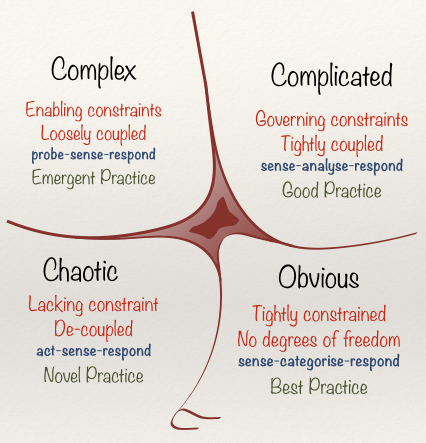
The term Cynefin Framework, using the Welsh word Cynefin for “natural habitat,” was chosen by Dave Snowden, Welsh psychologist and professor of knowledge management. The Cynefin Framework describes applications of evolutionary principles of complex systems to knowledge management and ways to work with the uncertainty inherent in emergent systems. This framework attempts to characterize the unpredictable nature of innovation, drawing on basic concepts in complex adaptive systems theory, cognitive science, anthropology, and narrative patterns, as well as evolutionary psychology, and proposing a novel approach to communication, decision-making, policy-making, and knowledge management in complex social environments. Agile software coaches adapt these principles as shown in the diagram below, drawn at a meeting of the Silicon Valley Agile Leadership Network at Cisco, co-organized by earthDECKS team member Dennis Britton.
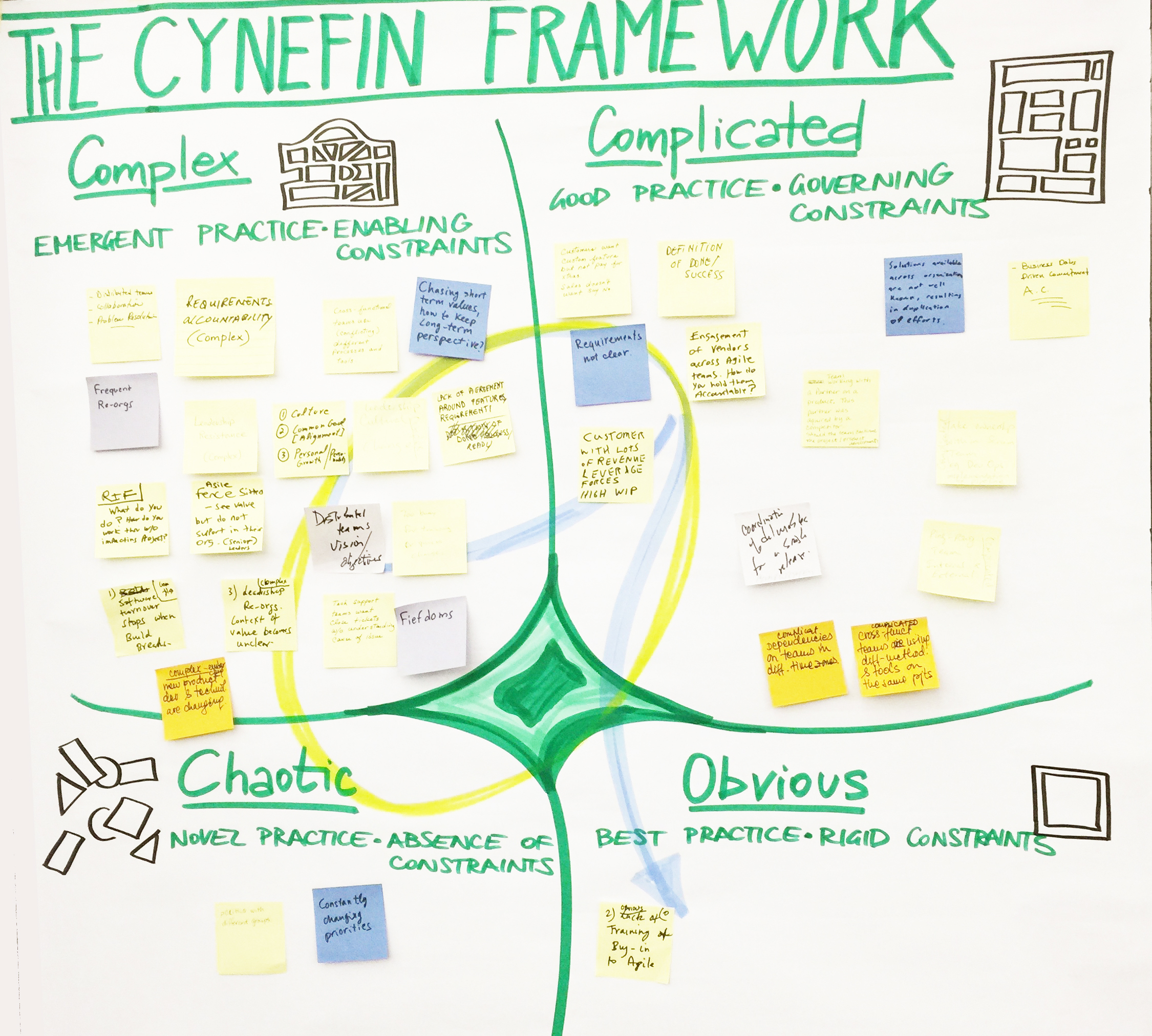
Related Topics: Saving Our Oceans from Plastic
See the app @ earthDECKS.org
Saving Our Oceans from Plastic: articles by Zann Gill
- Adverse Health Effects of Plastic
- Aquaria – Informal Learning Network
- Beat the Microbead
- Bibliography: Plastic Roads
- Boyan Slat: Floater Technology for Ocean Cleanup
- Complex Systems Problems
- Cradle to Grave: Plastic Supply Chain
- Dame Ellen MacArthur: The Circular Economy
- Sylvia Earle: Learning for a Plastic World
- earthDECKS Limelights: Companies to Watch
- Enshrouded in Plastic
- Flamingos Signal the Future We Face
- Floating Trash: More than 4x as bad as we thought
- Give the World a Helping Hand: 3D Prostheses
- Global Ocean Sensing
- Industry Response to the Plastic Challenge
- Nature’s Innovators: plastic consumers
- Ocean Debris Network
- Ocean Ingenuity
- Oceans – Measuring Planet Health
- Plastic Bank – The Exchange Economy
- Plastic – Climate Change Connection: Israel & UBQ
- PLASTIC: Complex Systems Problem
- Plastic: Drinking Water, Table Salt & Mother’s Milk
- Plastic Footprint – Carbon Footprint
- Plastic-Eating Enzyme
- Plastic Gyres and Social Justice
- Plastic Impact Calculator
- Plastic Pollution Coalition: Campaign vs Single Use Plastic
- Plastic & Public Health: Endocrine Disruptors
- PLASTIC: Overview of National Leadership
- Plastic Roads – Global Innovation Ecosystem
- Plastic – The Circular Economy
- The Plasticene
- Plastiki: adventure stories & a big message
- Raising Awareness of Plastic Hazards
